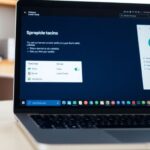Public Wi-Fi networks are a boon for on-the-go internet access, but they can also pose significant security risks. While the security of these networks has improved over time, it’s crucial to remain vigilant to protect your personal information. This article will explore various strategies for staying safe on public Wi-Fi networks, from understanding their security to responding effectively to potential threats.
Key Takeaways
- Always verify the authenticity of a public Wi-Fi network before connecting, and avoid networks that don’t require a password for access.
- Use a VPN to encrypt your data and protect your online activities from prying eyes, ensuring you choose a reputable VPN provider.
- Limit sensitive transactions, like online banking and shopping, to secure, private networks and log out from services after use.
- Adhere to Wi-Fi etiquette by avoiding illegal activities, large downloads, and excessive bandwidth usage to maintain network integrity.
- Stay informed about the latest security threats and scams, and know how to report suspicious activity to protect yourself and others.
Understanding Public Wi-Fi Security
The Evolution of Wi-Fi Hotspot Security
As we’ve embraced the digital age, public Wi-Fi hotspots have become ubiquitous, offering us the convenience of staying connected on the go. But with this convenience comes a heightened need for security. Hotspots are not a new concept, but as they’ve evolved, so have the methods to protect users from cyber threats.
The landscape of Wi-Fi security has seen significant changes, with advancements aimed at safeguarding user data against various forms of cyber-attacks. From data interception to rogue hotspots, the risks are real, and the stakes are high.
Here’s a quick look at some of the security challenges we’ve faced over time:
- Data Interception: The threat of man-in-the-middle attacks capturing sensitive data.
- Rogue Hotspots: The risk of connecting to malicious networks disguised as legitimate ones.
- Data Sniffing and Eavesdropping: The ease of capturing unencrypted data over public networks.
The growth of public Wi-Fi is a testament to our need for constant connectivity, but it also underscores the importance of enhanced security protocols and responsible user behavior. As we look to the future, with the expansion of next-gen wireless technology, our commitment to security must evolve in tandem to protect against the ever-changing landscape of cyber threats.
Identifying Secure and Insecure Networks
When we’re out and about, connecting to public Wi-Fi can be a real convenience. But not all networks are created equal, and it’s crucial to tell the secure from the insecure. A secure network often requires a password or network key, while an insecure one might let you connect without any credentials. Here’s a quick rundown to help you spot the difference:
- Secure Networks usually have a lock icon next to the network name, require a password, and use encryption protocols like WPA2 or WPA3.
- Insecure Networks are often open, without a password, and lack encryption, making them a playground for hackers.
At Omaha Computing Solutions, we’re all about keeping your data safe. That’s why we stress the importance of using a VPN, especially on public networks. It’s like a secure tunnel for your data, shielding it from prying eyes.
While we can’t always avoid using public Wi-Fi, we can take steps to protect ourselves. Always verify the network you’re connecting to is legitimate and not a rogue hotspot set up by someone with bad intentions.
Remember, using public Wi-Fi responsibly includes being aware of the network’s security. Keep an eye out for signs of a secure connection and steer clear of networks that don’t measure up. And of course, keep your devices up to date with the latest security patches and protections.
The Risks of Unencrypted Wi-Fi Access
When we’re out and about, connecting to public Wi-Fi can seem like a blessing. But without encryption, that convenience could cost us more than we realize. Public Wi-Fi networks often lack encryption, leaving the information we send as open books for cybercrooks. It’s like sending a postcard through the mail—anyone who gets their hands on it can read your message.
Here’s a quick rundown of the risks we face on unencrypted networks:
- Data Interception: The threat of man-in-the-middle attacks is real, and it can compromise sensitive data we send or receive.
- Rogue Hotspots: We might connect to malicious networks disguised as legitimate ones, putting our data in jeopardy.
- Data Sniffing and Eavesdropping: Our unencrypted data is up for grabs to anyone with the right tools.
- Malware Distribution: Compromised networks could serve us harmful software without our knowledge.
- Session Hijacking: Our active sessions, like email or social media, could be taken over by someone with ill intent.
While the convenience of public Wi-Fi is undeniable, the risks that come with it are too significant to ignore. We need to be vigilant and take steps to protect our data.
Remember, just because a network requires a password doesn’t mean it’s safe. We’ve got to keep our eyes peeled for signs of tampering or suspicious activity. And hey, managing our Wi-Fi profiles efficiently, especially on the latest operating systems like Windows 11, can give us an edge in security. Prioritizing networks, forgetting the ones we no longer use, and setting up metered connections are just a few ways we can keep our digital lives a bit safer.
Best Practices for Safe Public Wi-Fi Use
Verifying Network Authenticity
We’ve all been there, settling down at a coffee shop with our laptops, ready to take advantage of the free Wi-Fi. But before you dive into your digital tasks, it’s crucial to ensure you’re not connecting to a rogue network. Always verify the network’s name with the venue to confirm it’s legitimate. Here’s a quick checklist to help you out:
- Look for official signage or ask staff for the correct network name.
- Check for typos or suspicious variations in the Wi-Fi name.
- Avoid networks that don’t require a password, unless confirmed by the venue.
It’s easy to overlook the importance of connecting to the right network, but this simple step can shield you from many potential threats.
If you’re unsure about a network, it’s better to stay off it until you’ve got confirmation. After all, the few minutes you spend verifying can save you from a heap of security issues down the line.
Limiting Sensitive Activities
When we’re out and about, connecting to public Wi-Fi can be a real convenience. But let’s be smart about it, especially when it comes to sensitive activities. We should always avoid using public Wi-Fi for things like online banking or shopping. It’s just not worth the risk, as these networks may not be secure, and we don’t want our personal details floating around for anyone to grab.
Here’s a quick rundown of do’s and don’ts:
- Do verify any requests for money or sensitive information by contacting the organization directly.
- Don’t engage in activities that require high bandwidth, like streaming or downloading large files.
- Do use a VPN to encrypt your connection and keep your activities private.
By sticking to these simple guidelines, we can keep our data safe and still enjoy the convenience of public Wi-Fi.
And hey, while we’re talking about keeping things secure, let’s not forget to educate ourselves on safe program uninstallation, implement User Account Controls, and set up System Restore points. It’s all about protecting our data and ensuring our system’s security.
Logging Out After Use
Once we’re done browsing on public Wi-Fi, it’s crucial to log out from all services we’ve accessed. This simple step can significantly reduce the risk of unauthorized access to our accounts. It’s like locking the door behind you when you leave the house; it’s a basic security measure that goes a long way.
Here’s a quick checklist to ensure you’ve covered your tracks:
- Clear your browsing history and cache.
- Log out of all accounts.
- Close all running apps.
- Update and run your antivirus software.
- Turn off Bluetooth to prevent unwanted connections.
By taking these actions, we’re not just protecting our own data, but also contributing to a safer online environment for everyone.
And while we’re on the topic of safety, let’s not forget about our devices. We should always consider battery life, build quality, and OS compatibility when choosing a laptop. It’s wise to anticipate future software needs to avoid redundancy and ensure our tech is up to snuff for secure browsing, wherever we may be.
The Importance of VPNs on Public Networks
How VPNs Protect Your Data
We all love the convenience of public Wi-Fi, but it’s crucial to keep our data under wraps while we’re sipping that latte and scrolling through emails. That’s where VPNs come into play. A VPN, or Virtual Private Network, acts like a secret tunnel for your data. It encrypts your internet traffic, making it unreadable to anyone who might be snooping. This means that even if a cyber-criminal intercepts your data, all they’ll see is a jumble of gibberish.
Here’s a quick rundown of why we’re big fans of using VPNs on public networks:
- Privacy: Your IP address is hidden, so your online actions can’t be traced back to you.
- Security: Encryption is your best friend when it comes to keeping your personal information out of the wrong hands.
- Freedom: With a VPN, you can access content that might be restricted on certain networks.
By channeling your data through distant servers, a VPN not only secures your details but also conceals your whereabouts.
Remember, not all VPNs are created equal. It’s essential to choose one that’s reliable and committed to protecting your privacy. After all, using a VPN is about taking control of your digital footprint and ensuring that we’re not leaving any traces behind.
Choosing a Reliable VPN Provider
When we’re on the hunt for a VPN provider, we’re not just looking for a way to watch our favorite shows from anywhere; we’re entrusting them with our digital safety. Choosing the right VPN is crucial for maintaining privacy and security online, especially on public Wi-Fi. Here’s what we keep an eye out for:
- A strong track record of privacy and no-log policies
- High-speed connections and reliable performance
- A variety of server locations for better access and speed
- Robust encryption methods and security protocols
- Compatibility with multiple devices and operating systems
It’s not just about the features; it’s about the peace of mind that comes with knowing your data is encrypted and your online activities are private.
Remember, a good VPN provider should offer more than just a tunnel for your data. Look for additional security features like ad blocking and malware protection. And while we’re all for saving a buck, free VPN services might not provide the robust security you need. Investing in a reputable VPN service is investing in our digital well-being.
VPN Usage Guidelines for Remote Work
When we’re tapping into public Wi-Fi from our favorite coffee shop or during a layover at the airport, we always make sure to fire up our VPN. A VPN is our digital cloak, shielding our activities from prying eyes and ensuring that our data remains encrypted and out of reach from network snoopers.
Here’s a quick rundown on how to use a VPN effectively for remote work:
- Always choose a VPN from a reputable provider.
- Connect to the VPN before accessing any sensitive work resources.
- Ensure that the VPN is active throughout your work session.
- Disconnect from the VPN once you’ve completed your tasks.
It’s not just about security; it’s about peace of mind. Using a VPN means that even if the Wi-Fi network is compromised, our work stays safe and sound.
And let’s not forget, while VPNs are a robust security tool, they’re not a free pass to hog the network. We’re all sharing this digital space, so let’s be mindful and keep our bandwidth usage in check—streaming that high-definition video can wait until we’re on a more secure connection.
Public Wi-Fi Etiquette and Considerations
Responsible Browsing and Bandwidth Usage
When we’re out and about, connecting to public Wi-Fi is a convenience we’ve all come to appreciate. But it’s important to use this resource responsibly. We should always be mindful of our online activities, especially when it comes to bandwidth consumption. Public networks are shared spaces, and our actions can impact others’ experiences.
Here’s a quick rundown on how to be considerate of bandwidth on public Wi-Fi:
- Stick to light browsing and social media checks.
- Refrain from downloading or uploading large files.
- Avoid streaming high-definition video or music.
- Use a VPN to encrypt your data and mask your traffic, which can also help with bandwidth management.
By being considerate of our bandwidth usage, we not only ensure a smoother experience for ourselves but also for those around us. It’s about being a good digital citizen and respecting the shared nature of public Wi-Fi.
Remember, public Wi-Fi isn’t just about convenience; it’s a community resource. Let’s make sure we’re all doing our part to keep it running smoothly for everyone.
Legal and Ethical Use of Wi-Fi Services
When we’re out and about, hopping onto a public Wi-Fi network can feel like a lifesaver. But just because it’s there, doesn’t mean we should use it without a second thought. We’ve got to play by the rules, both legally and ethically.
For starters, always respect the terms of service of the Wi-Fi provider. If a network requires a purchase or is intended for customers only, honor that. It’s not just about good karma; it’s about respecting the business that’s offering the service.
Ethical use also means being mindful of the network’s bandwidth. If everyone streamed high-definition videos, the network would crawl to a halt. So, let’s be considerate and save the heavy-duty tasks for our secure home networks.
Lastly, remember that not all networks are open for a reason. Some are restricted to protect sensitive information or to manage bandwidth effectively. If you come across a blocked network, don’t try to hack your way in. It’s not just about the potential legal repercussions; it’s about respecting privacy and security measures that are in place for a reason.
Respecting Network Performance for All Users
We all love the convenience of hopping onto a public Wi-Fi network to catch up on our daily digital chores. But it’s crucial to remember that we’re sharing these resources with others. To ensure a smooth experience for everyone, we should be mindful of our online activities. Here’s a quick rundown of do’s and don’ts:
- Stick to light browsing and social media checks.
- Refrain from bandwidth-heavy tasks like large downloads, streaming, or uploading big files.
- Always use a VPN to protect your data from prying eyes.
By following these simple guidelines, we contribute to a better network experience for all users.
And if you’re ever in a bind with network settings or need to keep an eye on system health and security, remember that you can configure network settings easily with PowerShell for Omaha computers. For extra help, don’t hesitate to reach out to us at Omaha Computing Solutions.
Responding to Security Threats and Scams
Recognizing and Reporting Suspicious Activity
We’ve all come across something fishy online, and it’s crucial to know how to handle it. If something seems off, trust your gut and investigate further. Be on the lookout for emails with mismatched sender addresses or urgent language that pushes you to act quickly. These are classic signs of phishing attempts.
When you spot a scam, reporting it is just as important as recognizing it. You can report scammers to the FTC at ReportFraud.ftc.gov. It’s a straightforward process, and your report could help prevent others from falling victim to similar scams.
Here’s a quick checklist to help you identify suspicious activity:
- Check the sender’s email address for authenticity.
- Beware of threatening language or unrealistic urgency.
- Verify any requests for money or sensitive information independently.
By staying vigilant and reporting scams, we play a part in a larger community effort to combat fraud and protect each other.
Dealing with Compromised Computers
When we’re out and about, using computers Omaha style means staying vigilant, especially on public Wi-Fi. If you suspect your device has been compromised, it’s crucial to act swiftly to protect your digital identity. Immediately disconnect from the network to prevent further data leakage. Here’s what we at Omaha Computing Solutions recommend:
- Perform a full system scan with updated antivirus software.
- Change your passwords, ensuring they’re strong and unique.
- Check for any unauthorized transactions or activity on your accounts.
If you’re using used desktops Omaha sourced or Omaha used laptops, remember that these devices can be just as vulnerable. Whether it’s refurbished computers, refurbished laptops, or refurbished desktop computers, keeping your security software up to date is key. And don’t forget about the peripherals—computer monitors, computer printers, and even your computer mouse can be gateways for malware if they’re not properly secured.
For those of us who love gaming computers, the risks on public networks are just as real. A compromised device can lead to stolen in-game assets or personal information. So, whether you’re battling it out online or just browsing, make sure your defenses are up to par.
In the face of a security breach, taking immediate and comprehensive action is essential. This includes contacting any affected service providers and monitoring your accounts for unusual activity. By being proactive, we can minimize the damage and bounce back more quickly.
Remember, cybersecurity is a shared concern. We’re all in this together, and by following these steps, we help ensure a safer experience for everyone using public Wi-Fi.
Protecting Against ‘Sniffing’ and Data Theft
We’ve all heard the horror stories of data theft and the sneaky tactics hackers use to ‘sniff’ out our personal information on public Wi-Fi. It’s crucial to stay vigilant and proactive to keep our data safe. Here’s what we can do:
- Use encrypted connections: Always look for HTTPS in your browser’s address bar before entering sensitive information.
- Enable a firewall: This acts as a barrier between your device and potential intruders.
- Keep your software updated: Regular updates often include security patches.
While we’re out enjoying our favorite coffee shop’s Wi-Fi, let’s not forget that our data could be at risk. It’s like leaving the windows of your house open; you wouldn’t do that, so why leave your digital life exposed?
Remember, at Omaha Computing Solutions, we’re committed to your security. Whether you’re shopping at our computer store, recycling your electronics, or in need of IT services, we’ve got your back with robust privacy policies and top-notch security measures. Don’t hesitate to reach out if you have any concerns or need assistance!
Conclusion: Staying Secure on Public Wi-Fi
In the age of constant connectivity, public Wi-Fi networks offer a convenient way to stay online while on the go. However, convenience should not compromise safety. As we’ve discussed, there are several steps you can take to protect your personal information on these networks. Always verify the legitimacy of a Wi-Fi network before connecting, use a VPN to encrypt your data, and be cautious about the types of websites you visit while connected. Remember, your digital security is in your hands, and by following these best practices, you can enjoy the benefits of public Wi-Fi without putting your personal information at risk. Stay informed, stay vigilant, and stay safe.
Frequently Asked Questions
How can I tell if a public Wi-Fi network is secure?
To determine if a public Wi-Fi network is secure, check if it requires a password for access. Networks with password protection are generally more secure. Additionally, verify the network’s name with the venue to ensure it’s legitimate.
Is it safe to access my bank account on a public Wi-Fi network?
It’s not recommended to access your bank account or other sensitive websites on public Wi-Fi due to the risk of data theft. If necessary, use a VPN to encrypt your connection and add a layer of security.
What are the risks of using an unencrypted Wi-Fi network?
Unencrypted Wi-Fi networks are susceptible to ‘sniffing’ by cyber-criminals who may steal personal information such as passwords and credit card numbers. Avoid using such networks for sensitive activities.
How does a VPN protect my data on public Wi-Fi?
A VPN encrypts the data traffic between your device and the VPN server, making it difficult for hackers to intercept and read your information. This is particularly important when using less secure public Wi-Fi networks.
What should I avoid doing on a public Wi-Fi network?
Avoid engaging in illegal or unethical activities, accessing sensitive information, and performing bandwidth-intensive tasks like large file transfers or streaming, which can slow down the network for others.
How can I respond to security threats or scams on public Wi-Fi?
If you encounter suspicious activity on public Wi-Fi, report it to the service provider or authorities. Use security software to protect your device and be vigilant about the information you share online.








